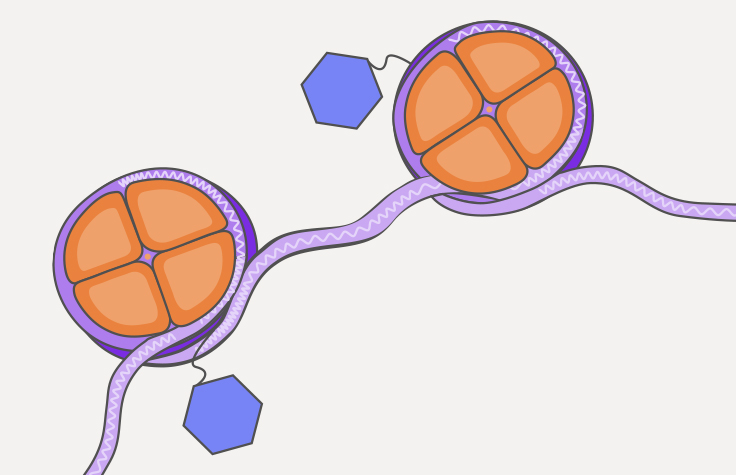Epigenomics
Understanding epigenetic modifications and their impact on gene regulation
Powerful solutions for studying genetic changes beyond the DNA sequence

What are epigenetics and epigenomics?
Epigenetics is the study of changes in gene activity caused by mechanisms other than DNA sequence changes. Epigenomics is a broader term and refers to the complete study of epigenetic changes of many genes within a cell or organism. Both epigenetics and epigenomics analysis can involve studying alterations in DNA methylation, DNA-protein interactions, chromatin accessibility, histone modifications, and more.
Regardless of the approach, RNA-Seq with NGS enables higher discovery power owing to its wide detection, high sensitivity, and low bias while having scalable capabilities for high-throughput applications.

A fuller picture of gene expression profiling
This eBook discusses genomics applications in gene expression and regulation research. See how RNA-Seq and epigenetic methods provide complementary information.
Download eBookKey epigenetic techniques
Explore specific techniques to study the epigenome with solutions for methylation patterns, DNA–protein interactions, and chromatin analysis.
DNA methylation analysis
Investigate methylation patterns quantitatively across the genome using sequencing- and array-based techniques.
DNA–protein interaction analysis
Gain insight into DNA–protein interactions. Investigate the potential impact of chromatin modifications and local structural changes on gene expression.
Chromatin accessibility analysis
Use ATAC-Seq to evaluate regions of open chromatin across the genome. ATAC-Seq can be performed on bulk cell populations or single cells at high resolution.
How is epigenomics used in multiomic profiling?
Explore how scientists use epigenetics to gain important insights into areas such as infectious diseases, cancer, and biomarker discovery. These areas can be combined with other methods to add another layer for your next multiomic research project.
Gene target ID for complex disease research
Combining methylation analysis and differential gene expression analysis can help scientists prioritize genes for further study and elucidate complex disease mechanisms.
The epigenetics of metastasis
Researchers use methylation arrays and NGS to investigate the epigenetics behind cancer metastasis.
NGS proves invaluable for biomarker discovery
Researchers use NGS to study DNA-protein interactions, analyze gene expression, and assess coding exons.

Decoding complex pathways with 5-base analysis for multiomic insights
In this eBook, discover the value of studying the methylome and genome, together, to unravel the mechanisms of genetic disease, cancer, and other complex diseases.
Download eBookAdditional resources
Introduction to epigenetics
Watch this webinar to learn about the basics of the epigenome, including topics on epigenome-wide association studies (EWAS), DNA methylation, and epigenetic aging as an emerging field.
Cancer epigenetics
Studies of epigenetic alterations in cancer, such as aberrant methylation and transcription factor binding, can provide insight into important tumorigenic pathways.
Complex disease genomics
Genome-wide methylation profiling can help researchers understand the mechanisms behind complex diseases. Aberrant methylation has been implicated in complex disorders such as Alzheimer’s disease and asthma